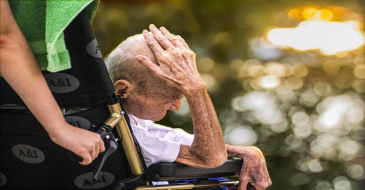Are We Failing to Provide Essential Care During COVID-19?
Misty Roberts Oct 27, 2020
Hospice, as a branch of palliative care, addresses all aspects of care as they relate to patients and caregivers. This includes physical, mental, psychosocial, and spiritual needs. Hospices use an interdisciplinary team approach to care for those who are terminally ill. This team includes nurses, doctors, social workers, spiritual counselors, dieticians, aides and other therapies. Hospice agencies are charged with helping people die with dignity and without suffering. The pandemic, COVID-19, has created unique challenges for healthcare. Hospices are experiencing some of these obstacles and are working to find ways to care for their patients.
Because of the current national emergency declaration due to COVID-19, Medicare and State regulated facilities, including skilled nursing facilities, long term care facilities, assisted living facilities, and group homes (facilities, hereafter) have been directed by the Centers for Medicare Services to limit visits inside the facility to only those that are “essential.” Medicare does not define essential, leaving it up to the facilities to determine what this means. Many facilities have determined that nurses are the only “essential” disciplines that can be allowed into their buildings. These facilities are not allowing the other hospice disciplines in to care for the patients. Hospice social workers, spiritual counselors and volunteers are being excluded from visiting the patients in many circumstances. These disciplines have developed relationships with these patients and play a vital role in the patients’ well-being.
Hospices help to manage symptoms so the patients can live the last chapter of their lives as well as possible. However, there is more to consider here that just the physical symptoms. As patients and families are forced to face their own mortality, a new type of suffering which they may be unfamiliar with may occur. They often start to question the meaning of it all. What will happen hereafter? Did I live a “good” life? How will I be remembered? Nurses are often not equipped to address this type of existential suffering. Hospice social workers and spiritual counselors have been specifically trained to help patients through this. Leading the patients to find meaning, forgiveness and reconciliation is as much of an essential part of hospice as controlling pain and other physical symptoms. However, hospice agencies are currently being limited on the type and amount of care they can provide.
Hospice social workers, spiritual counselors and volunteers are coming up with creative ways of interacting with patients. Some of these include telehealth, video conferencing, sending cards and letters, painting the patient’s windows, participating in a drive by parade, and performing musical events outside of the patient’s windows. However, people, as social beings, need deeper interactions with others. Interaction with family members, friends and other love ones are important. This is even more evident during a time of uncertainty and terminal illness.
As these patients are being isolated and not receiving as much physical, mental and spiritual care as before, they are dying faster, with increasing depression and loneliness, with their symptoms less managed. As we witness the rapid acceleration in the rate of decline in hospice patients following this mandate, we are left to wonder if we are overlooking spiritual and mental health of those to whom we have committed to care. To say that a human is just a physical being is a failure to realize all the spirit and love a human being has to offer.
It is understandable that facilities want to protect their staff and patients from infection from COVID-19 and that is why they are limiting the visits. However, hospice clinicians have been trained on standard precautions, including increased precautions as this pandemic rages on. If hospices can demonstrate to the facilities their increased infection control measures to help ensure their staff’s and patients’ safety, the clinicians should be allowed to care for these patients. Facility administrators, physicians and communities need to understand the importance of treating the whole person. Only through education and understanding will patients fully benefit from all that hospice has to offer, especially during this tumultuous time of the COVID-19 pandemic.